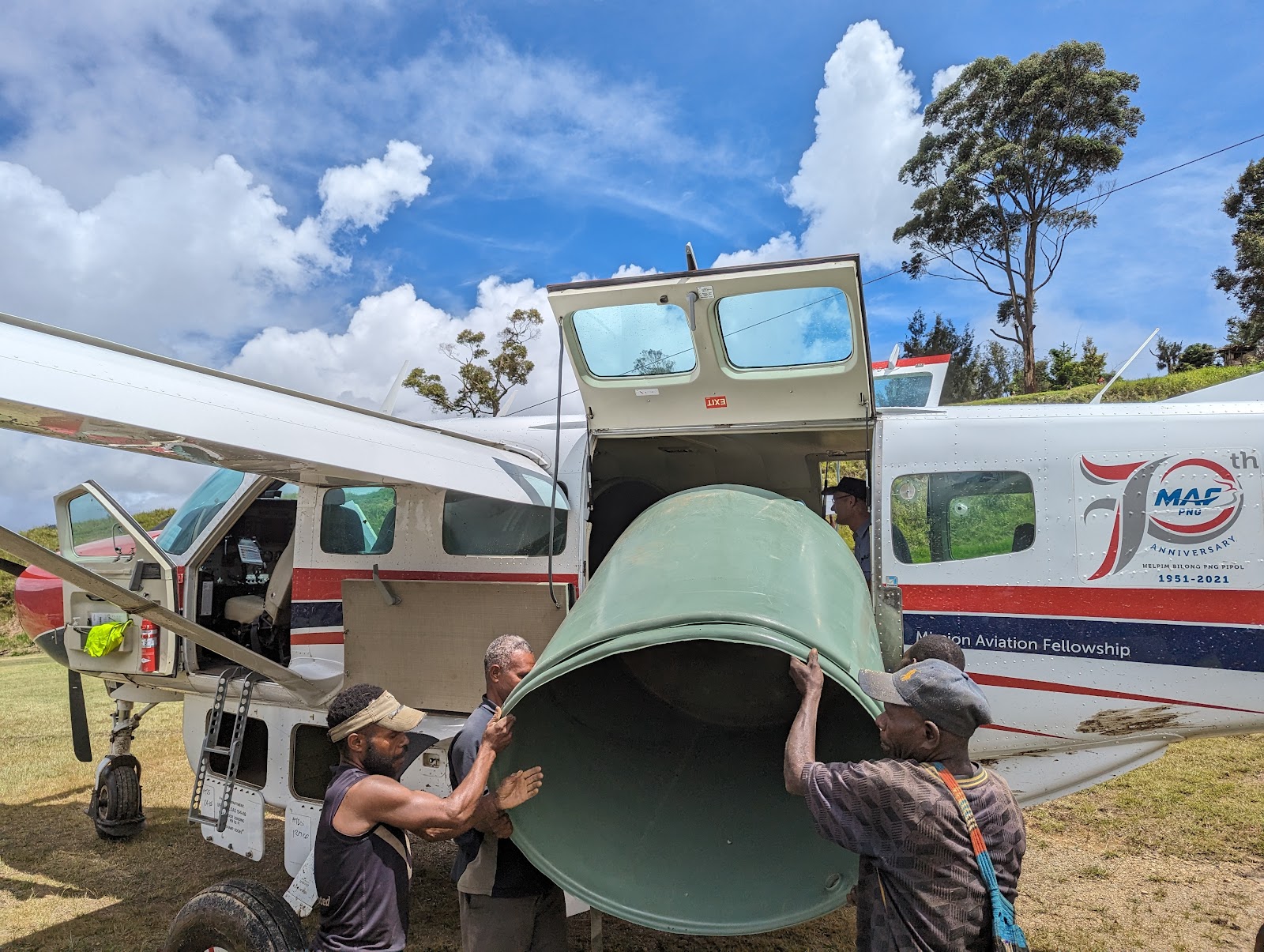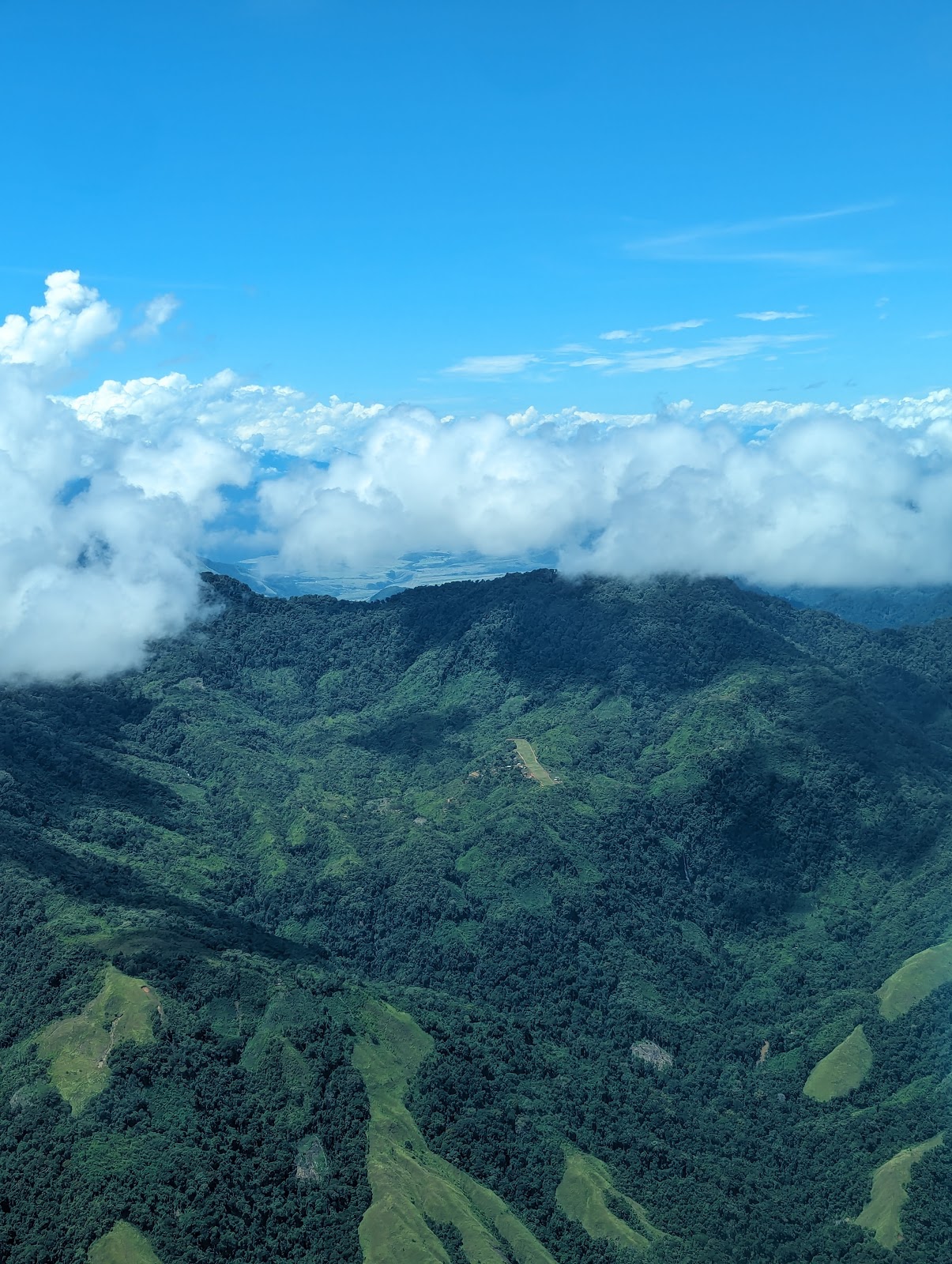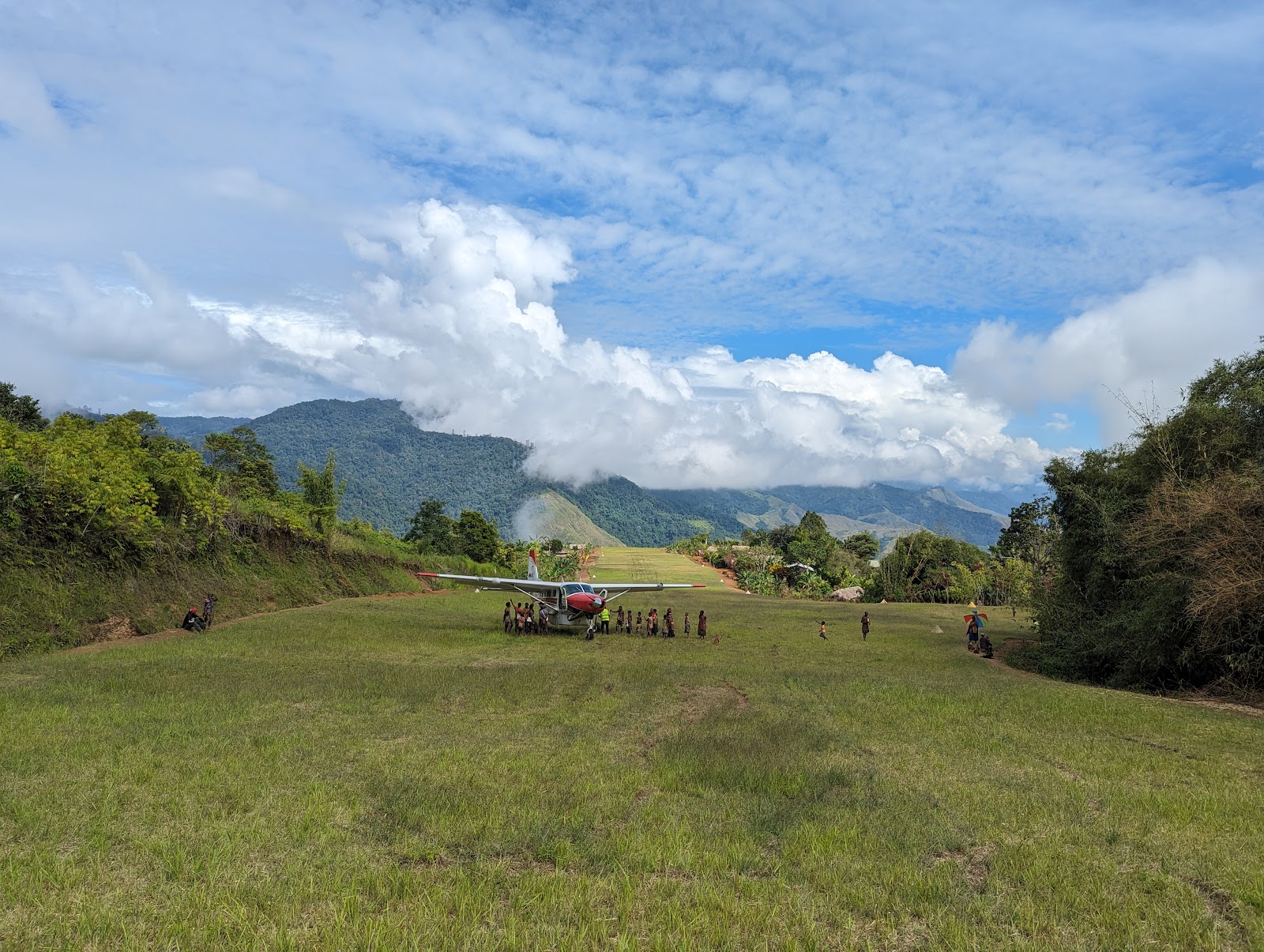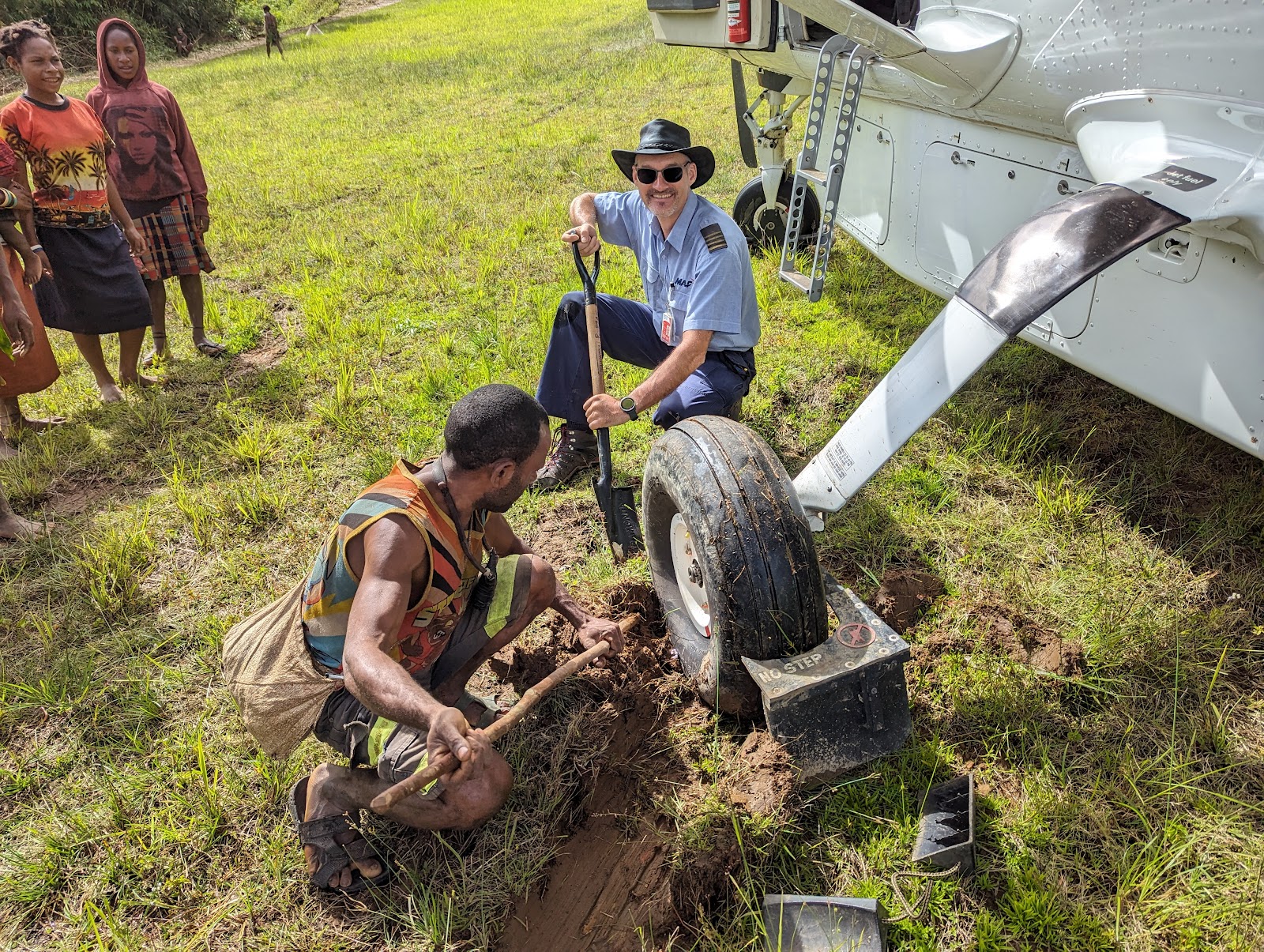Sunday, September 8, 2024
Real Conversations
Tuesday, June 25, 2024
Rooted
I think that Balimo will be our kids' first memory of home. Even though Nova was almost two and a half by the time we moved here, it struck me again today how unsettled and constantly changing our life has been in the past few years. We've only been living in Balimo for nine months -- and still, it feels more like home than any other place I can imagine right now. We're definitely growing roots here by establishing relationships, building friendships, and developing routines of life.
Our mornings at home usually start with the same barrage of questions: "Mom, is Agi Jackie coming today? Where is she now? Is she walking? Can I look to see if I can see her on the road?" As long as Jackie is around, Nova is her faithful companion; if Jackie is sweeping, Nova will find a broom to sweep. If Jackie is pulling out weeds, Nova will be pulling weeds (or picking flowers). If Jackie arrives in a blue shirt, Nova will come to me with the first blue shirt she can find, in need of an urgent change of clothes. It is great to see how well Jackie responds to both kids, and their excitement about her provides me some time to work on unfinished or new projects. We are so grateful for everything that she does!
It is great to see Nova connecting so well with another adult, but it has always been a priority for us that our children have the opportunity to play and build friendships with other kids. When we were asked if we would be willing to serve in a remote location in PNG, our answer was "Yes, so long as there will be other kids for our kids to play with." We were assured that in a country like this, there are always kids around -- and while that is true, it can be difficult for expatriate kids to connect deeply with local kids.
Our children, on various levels, grow up as a novelty. Their hair gets touched with curiosity, and they are pointed at from across the street when out on a walk. Everything that they do in public is given special attention, and if they try to play with others they are catered to and given preference with every move they make. If they even begin to say the words "I want," someone will be listening eagerly to grant their request. The interactions are strange to watch, but in the first few months of our time in Balimo, this was reality for Nova. As we passed the three month mark in our new home, I realized that while everyone knew our names, we really hadn't formed any natural relationships.
So began my quest to create an environment in which the priority for our family was actually put into action. We started by walking around the area with a ball, calling kids down from their houses to play. After several weeks of making our rounds, we started to get to know some of the local children and their families a bit better. Once that happened, it opened the door to start inviting friends to play at our house. With time and repetition, I could see the shift of perception: Nova was first identified by her skin colour, then by the toys that she had, and finally as just another kid. It seemed that each relationship went through these stages, but with time and persistence she has been developing real friendships. It is so rewarding to see her interacting with other kids in a natural way, building critical social skills such as the art of give and take.
Relationships like these are what really deepen our roots. Without close relationships, it is easy to pick everything up and move on to the next place, just like a tree without strong roots can easily be uprooted and blown away. Relationships are the cords that bind us and the roots that plant us. Our children don't have any strong memories of home in another place, which makes it easier for them to grow roots here. Though it may not be quite as easy for us as adults, we have definitely felt the same process happening in the last few months.
In March, we decided to start a Teen Night to provide a safe and engaging space for teenagers to socialize and develop life skills. What started out as a shy and quiet group with different members each week has turned into a consistent dozen of eager faces. Through the medium of board games and group activities, these teens have found a special place in our lives; I think that we look forward to Friday evenings almost as much as they do!
With each week that passes and each new name we learn, we are integrating into the community here in Balimo. Life has it's ups and downs, but we have been shown God's faithfulness to each of us many times. On Sunday as we read through the book of Ephesians together, verses 14-21 of Chapter 3 spoke as if it were a prayer into our life:
For this cause I bow my knees unto the Father of our Lord Jesus Christ, of whom the whole family in heaven and earth is named, that he would grant you, according to the riches of his glory, to be strengthened with might by his Spirit in the inner man; that Christ may dwell in your hearts by faith; that ye, being rooted and grounded in love, may be able to comprehend with all saints what is the breadth, and length, and depth, and height; and to know the love of Christ, which passeth knowledge, that ye might be filled with all the fulness of God.
Now unto him that is able to do exceeding abundantly above all that we ask or think, according to the power that worth in us, unto him be glory in the church by Christ Jesus throughout all ages, world without end.
Amen.
Tuesday, May 28, 2024
Steep Strips
Monday started with a ground briefing where we discussed the procedures, challenges, and all other things related to operations into steep airstrips. After lunch, we strapped ourselves into our seats and took off for Dusin, a small village with a 400m long airstrip at a 9% slope, with a few passengers and some water tanks. As we neared the airstrip, our discussions were focused around how to determine aiming points and the standard for approaching steep airstrips. Our wheels touched down and my brief adrenaline rush subsided, though I realized very quickly that I couldn't let my focus slip yet. As I taxied the aircraft to the parking bay, it kept trying to slide on the slope of the hill. Managing the energy and momentum of the plane's weight became crucial while taxiing so that we didn't slip off the airstrip!
On Tuesday we had a full programme ahead of us, so took off as soon as we could in the morning. Our first destination was Kompiam, where we picked up some health workers. I received a warm welcome from the village as well as the doctor aboard my flight, all who remembered me from our time spent in Kompiam during language training. We flew the health workers to Rum, a village only 5 minutes of flying away. There is a road connecting the two villages, but it is currently impassable due to washouts; even without washouts, the road is very dangerous because it is carved onto the very edge of a steep mountain.
Thursday was another busy day in the highlands with a programme including a few steep airstrips. We started the day by bringing some passengers to Megau, which has a 460m long airstrip. The unique thing about this strip is that it begins with less than 5% slope, but ends off with an 18% slope at the top end for an average of 8.5%. This makes the touchdown on a relatively flat surface, but then I needed to continue to add much more power than usual to make it to the parking bay! After dropping off the passengers, we began taxiing up to the very top of the airstrip for takeoff, but got stuck in the soft ground. This was another tricky experience; when an airplane is stuck on a slope it can tip backwards onto the tail very easily. To prevent this, I stayed in my seat to keep enough weight in the front of the plane while my instructor got out to put a tail stand on the back of the plane. After digging out and clearing the mud around the tires, we started our airplane up to continue. While turning around for take-off, we bogged again; thankfully, we were soon out of the mud and off and away towards Rum to pick up the healthcare workers that we dropped off on Tuesday and return them to Kompiam.
Monday, March 25, 2024
Blessings
I open the door to Ezra's bedroom and am still surprised by the cold blast of air that greets me. Picking him up, I rub my hand through his silky hair, which is no longer soaked with sweat after each nap. Spending some time in an air conditioned room each day has completely cleared up both kids' rashes, and gives especially Nova an extra dose of energy as well. It is still baffling that an air conditioner set to somewhere between 28 and 30 degrees Celsius can provide so much relief, but we are so thankful for this blessing and the positive effect it has already had on our kids.
When Brandon was preparing to fly in Papua New Guinea, one of his instructors told him to remember not to change his goalposts in life. "Even when you are used to flying into the difficult airstrips that will be your new normal, remember that it is not normal." The same is true about our basic standards of living, but we catch ourselves having to relocate our goalposts back to their original position every now and again. Since moving to Balimo, we got accustomed to the water that came from our taps -- the water we used for cleaning, washing laundry and dishes, and showering and bathing -- which, with no exaggeration, was a dirty orange colour. With only six to eight inches of water in a sink or bucket, the bottom would no longer be visible. Recently, a new UV water filter system was installed here to clear up our entire water supply, and the things we noticed made me realize that my goalposts definitely had to be reset! It was a surprise to me to be able to see the kids' legs in their bucket of water that they use as a bath, when before they disappeared, invisible, under the dirty surface. And who could even imagine washing dishes in clean water anymore? And my hair! It actually felt clean after showering, without needing to wash it as the very last step before turning the water off! Together with the air conditioning, we are so grateful for clean water, free of all of the bacteria that were giving us so many infections and skin problems.
Of course, these blessings do not mean that everything is easy now. Life in Balimo has tested us more than we imagined it would; not only physically, but also mentally, emotionally, and spiritually. Sometimes, it seems like each small victory is met with a few more obstacles to trip and stumble over for awhile... but through it all, we are called to be faithful to the One who remains faithful.
Wednesday, January 10, 2024
P.S. Christmas Reflections
The matron has finished introducing us guests to the patients, and has cued that we are ready for the first song. I lift my violin to play the tune of "Away in a Manger" and several of the hospital nurses begin to sing a Gogodala Christmas song to the tune. At the first sound of my violin, I feel life coming into lifeless eyes as they quickly turn and focus all of their attention on me. Somber faces light up as they hear an instrument that they have never heard (or heard of) before. As I play the last notes, I turn back to the girl who turned my heart inside out. She is sitting at the end of her bed, completely entranced. Her face is filled with wonder instead of pain, and she offers me a small, shy smile. The next song in the program I do not know, so I pass my violin off to a MAF doctor who happens to also play violin. She starts the song off while I try to learn and join in on the hand gestures and words. My mistakes make the children and adults grin, showing a spark of life that was absent when we walked into the ward. I always knew music was powerful; today I saw the extent of this power.
After singing a few songs together, the MAF doctor's husband shared a short devotional. Ears opened wide as he shared about the love of Jesus, a free gift. It is free, which means it cannot be bought. It is a gift, which means it cannot be earned. His words offered hope and encouragement, two things which can be hard to find in the TB ward of a dingy hospital. After a time of prayer, Nova whispered up, "are my pencils for the boy there?" Realizing the simple joys that can be given, we decided she could give her gift of a pencil to all the patients, young and old. She passed me pencils for each of the patients, which I then placed near them on their bed (TB is extremely contagious). We wished everyone a happy Christmas, and then moved on to the next ward.
Each time we repeated the process, I saw the same effects. Lifeless eyes lit up. Bodies that had trouble laying down begged to sit so they could see. Hope and joy were shared in a place that needed a glimmer of hope. A young man lay in his bed attached to an oxygen machine, clearly in a lot of pain. His cot was pushed in the corner of a room, so he wasn't able to see us playing or singing. When Nova approached to give him a pencil, his family told him that a "baby was coming to give a gift." She walked up close and held out a pink polka dot pencil toward him. His eyes looked up and a shaking hand reached out -- not towards the pencil, but towards her hair. He patted and rubbed her head with a smile in his eyes, and then took the small gift and placed it on the bed beside him. Nova came running back, saying "Mom, he touched my hair! And he liked the pencil. Does another sick person want my pencil?"
The final ward had a different atmosphere when we entered it, and Nova was overjoyed when she realized where we were. "Look mom, babies! Little babies!" The maternity unit had 8 cots, about 10 babies, and about 14 mothers, some of who were still waiting for their little one to arrive. Nova walked around with her little pink plastic bag, ensuring that each baby received a pencil. "They will use it when they're bigger, Mom? Like Ezra?"
After finishing the program in each ward, it was time to go. As we were walking back towards our vehicle, Nova ran up to me and asked to say bye to the babies one more time before going. She confidently walked up to each precious little one and gave them a little wave and a goodbye before we left to spend the rest of our Christmas Day at home, our thoughts still bound to that young girl who was so transfixed by a simple song.
We pray for change in the Balimo hospital, which struggles to function adequately without any doctors on staff. We pray for supplies to be delivered that enable life to be sustained and new life to be brought into the world. We pray for the patients who endure immense pain and difficulty without a single complaint, and we pray that the young girl's treatments would be effective in overcoming her TB infection. "Now unto him that is able to do exceeding abundantly above all that we ask or think, according to the power that worketh in us, unto him be glory in the church by Christ Jesus throughout all ages, world without end. Amen." Ephesians 3:20-21
And just like that, another Christmas has passed by; another New Year in a new place; time always seems to catch me by surprise! I have heard it said that life as a mother is filled with long days and short years, but with each year that passes this cliche rings truer. As at the beginning of most years, it is natural to look back on the year that is passed to reflect on the good and the not-so-good. This year, we didn't only reflect on the last year but on the last several, which have been filled with so many changes. In 2020, we were married, Nellicia started teaching, and we applied to serve with MAF. In 2021, Nova was born, Nellicia stopped working, and Brandon switched from instructing to raising support with MAF. In 2022, we moved to Papua New Guinea and settled into life in Mount Hagen, where Brandon started flying again. In 2023, Ezra was born and we moved to Balimo.
We spent this Christmas season finding new traditions and building special memories in Balimo, a very different place from the one our childhood was spent in. We had no fireplace to sit in front of or warm sweaters to keep us cozy, though we did enjoy a cup of hot chocolate on a cool morning (it was only 24 degrees)! Aside from the snowflakes we cut out and pasted onto our wall, there has been nothing wintry about Christmas -- after all, it is the middle of summer here in the southern hemisphere. We realized, however, that Christmas is still a special time even without a chill in our bones. We enjoyed a traditional Swiss Christmas dinner with our neighbours, which was a nice treat starring an amazing kind of sausage roll. Nova enjoyed learning the Christmas story and still insists on singing Away in a Manger at any opportunity.
As we welcomed this New Year, we commented that 2024 may be the first year in our married life that doesn't come with a major life change or transition; or maybe it will, and we just don't know about it yet! God has a way of directing our lives in ways that we never imagined from the outset, but He has shown time and again that we are not the authors of our life journey; instead, we must trust in the Author and follow His will as it is shown to us. "O house of Israel, cannot I do with you as this potter? saith the LORD. Behold, as the clay is in the potter's hand, so are ye in mine hand, O house of Israel." Jeremiah 18:6
A New Year
We wish you all a blessed new year and pray that God's grace will guide you in 2025. As we reflect on the past year, many different...
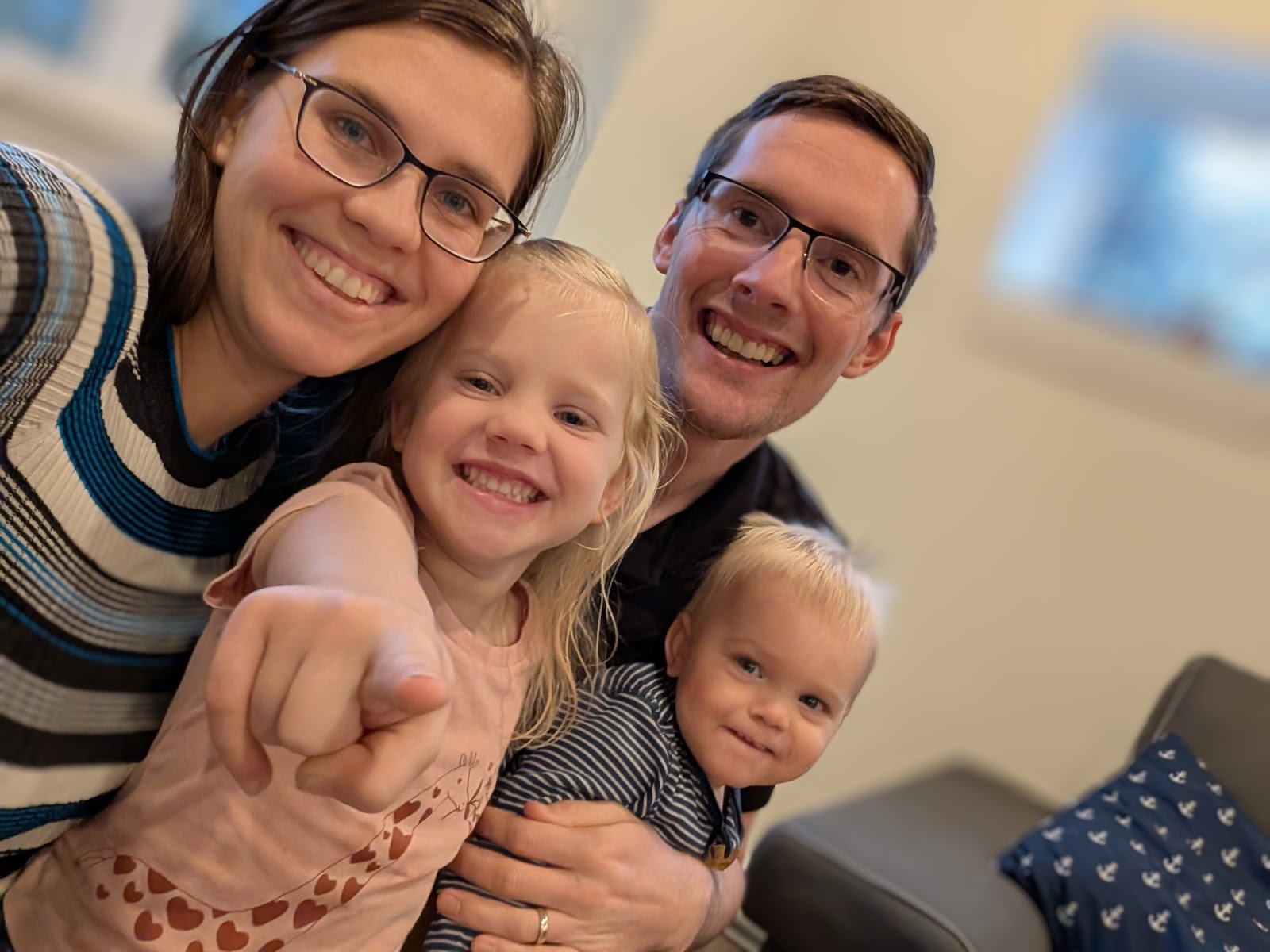
-
We were blessed with a healthy baby boy last week! Ezra John was born on July 19th, and we have all been spending the past 10 days adjustin...
-
When someone invites you for dinner and asks you to bring a plate, what do you do? "Do I need to bring a fork and knife as well?...
-
The impact that a single story can have on a child blows me away. In the past week, we were able to present to students from Kindergarten t...



